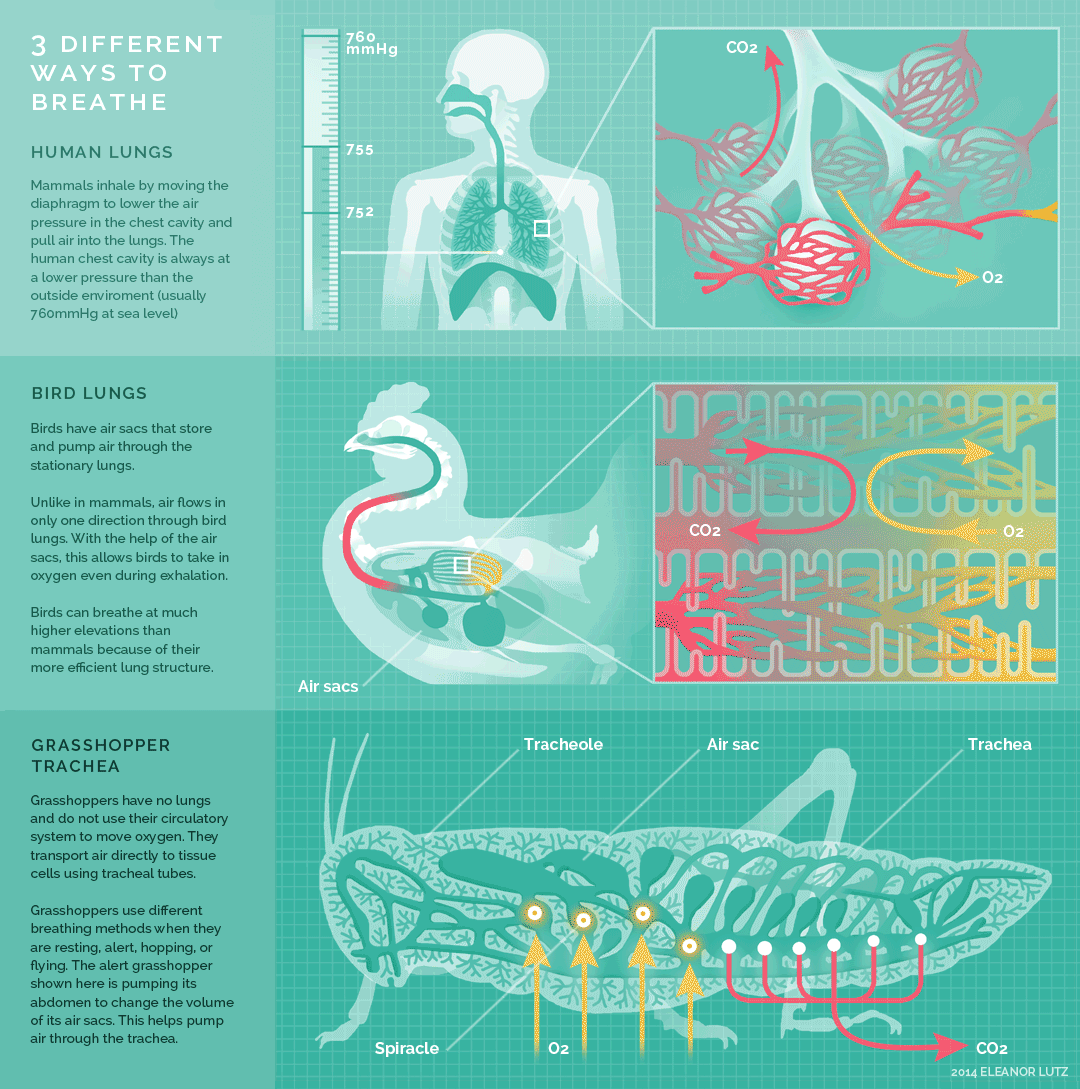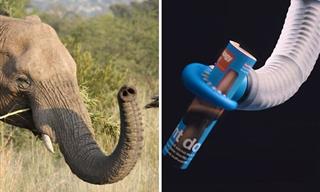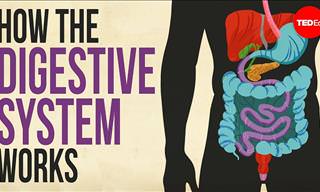
Breathing is essential to almost all living beings. Of course, you knew that already. However, while we have all become so conscious about our health today, how many of us actually give a second thought to the process of breathing and respiration?
Breathing is the most normal and regular activity we perform every minute of the day; even when we are sleeping. The process of breathing is fascinating across living beings. Here, we can take a detailed look at different ways of breathing in three different living beings – humans, birds and grasshoppers. Each of them has a respiratory system that is unique and will give a glimpse of nature’s curious ways.

1. Human Lungs:
Human lungs are part of the body’s respiratory system. The primary function of the lungs is to process the gas exchange for respiration. The lungs take oxygen from the environment and transfer it to the bloodstream. To breathe properly, humans use structures outside of the lungs - the diaphragm, the intercostal muscles (located between the ribs), the abdominal muscles, and sometimes, neck muscles as well.
The diaphragm, a muscle that sits below the lungs, does the majority of the work involved. When the diaphragm contracts, it moves down and provides more space in the chest cavity and enhances the lungs' ability to expand. The pressure inside goes down when the chest cavity volume increases. Then the air is sucked in through the nose or mouth and moves down into the lungs.
Another point worth noting is that the human chest cavity is always at a lower pressure than the outside environment. This is usually 760 mmHg (millimeters of mercury) at sea level.
2. Bird Lungs:
The respiratory system of birds is quite different from that of mammals. Birds do have lungs, but they do not have a diaphragm. The air moves in and out of their bodies through pressure changes in the air sacs. While the air sacs are not directly related to gas exchange, they do help in directing airflow through the lungs in one direction. The muscles in their chest cause the sternum to be pushed outward. Because of this, negative pressure in the air sacs is created which leads the air to enter the respiratory system.
The lungs of birds do not expand or contract like the lungs of mammals. They have thin-walled, tubular structures called parabronchi that are located throughout the lungs between the secondary bronchi. While the air moves in one direction through the lungs, it also flows in one direction through the parabronchi. Basically, from one secondary bronchus into another.
The respiratory system of birds transfers more oxygen with each breath. It is the remarkable air sacs, though, which really make the respiratory system of birds unique. They enable regular, one-way flow during both inspiration and expiration.
3. Grasshopper Trachea:
You would be surprised to know that grasshoppers have no lungs. Like all insects, they breathe through a complex network of tubules called the tracheae. While the exchange of gases happens through the tracheal system, it is the spiracles where the air is taken in first. This system is comprised of ten spiracles that are located along the length of the grasshopper’s abdomen in eight pairs. They also have two more pairs in the thoracic region.
Oxygen disperses into their cells directly and then into the atmosphere. This completes the grasshopper’s respiration process. Their spiracles take in air with the control of their brains. Furthermore, they also have a few spiracles that perform the job of expiration of air as well. The tracheae inside humans do the role of cleaning the air. For grasshoppers, this system works as an independent operation and is not involved with the circulatory system.

How To Take Control Of Your Wellbeing Through Breathing
Breathing seems obvious to most of us, but there is an art to it. Becoming conscious of your breathing could greatly benefit your mental and physical health.

The Musical Test That Could Detect Dementia Early
Researchers have developed a promising new approach: using music to detect the early signs of cognitive decline.

Scientists Discover the FIRST Animal That Doesn’t Breathe
This alien looking animal is a relative of jellyfish and it's outstanding, as unlike all other animals on Earth, it doesn’t require oxygen

Here's How Much Sleep You Need To Be Healthy
Learn how sleep affects your body and mind, thanks to this informative infographic.

Eye-opening Infographic Reveals What Extends Our Lifespan
This infogprhic sheds light on what truly increases our lifespan and what does the exact opposite

Is Microsoft's "AI Doctor" Better Than a Real Doctor?
A new study presents a committee of digital doctors achieving approximately 80% accuracy in complex medical diagnoses – far beyond the average of general practitioners.

Science in 2025: 8 Developments That Could Change it All
Here are some of the most exciting trends in science and healthcare to keep an eye on.

Chronically Late? What Science Has to Say About You
There are 8 positive things that science says about late people that we all need to know.
 5:16
5:16
Fascinating: How Fast Does Our Brain Operate?
Ever wonder at what speeds our thoughts move?
 6:05
6:05
The Real Reason Companies Prevent You from Fixing Things
Ever felt like you should be able to fix that broken gadget, but something's holding you back? Watch this to know more.

8 Important Inventions That Were a Complete Accident
It might be interesting for you to learn that some very important scientific innovations were born as a result of an accident.
 4:11
4:11
This Video Will Show You Where We Are in the Universe!
Where is our galaxy in the known universe? This video will fly with you to ever-larger destinations, showing you our little planet's cosmic address from a very large viewpoint.
 4:20
4:20
Ever Wondered About How Our Minds Retain and Lose Memories?
Ever wondered why you can remember something from 20 years ago, but have difficulty remembering what you had for lunch the other day? Learn why here.
 10:59
10:59
Fascinating Science: How Sand is Turned Into Glass
Have you ever looked through a window and wondered how it was made from simple beach sand? This video shows you that incredible process.
 8:10
8:10
Taller Doesn't Mean Bigger - the True Size of Skyscrapers
If you were to compare skyscrapers by area rather than height, which skyscraper would end up on top?

12 Earliest Versions of Tech Inventions We Use Every Day
Witness the evolution of 11 popular devices we use all the time by looking at how they all started...
 56:12
56:12
What's the Largest Thing in the Universe?
In this video, we look into some of the mightiest structures in the known universe.

14 Times Nature Inspired Groundbreaking Technology
Let’s explore 14 remarkable examples of how nature has shaped modern technology.
 1:44
1:44
You Won't Believe What the Human Body Does in One Minute
How much do you think it is capable of doing in a single minute? Watch this video and you'll have your answer!

Are You Ready to Learn About the Expanse of the Universe?
If you have an interest in the unknown, then look no further than these 15 unbelievably facts discovered about space
 16:26
16:26
Neanderthals Had Strength and Skills Beyond Our Limits
Neanderthals possessed truly exceptional, almost unbelievable, traits.

These 18 Photos Capture the Universe Like Never Before!
See the universe in a new light with these astonishing photos.
 5:50
5:50
Why Do We Sometimes Hallucinate? Find Out Here!
In this informative TED-Ed video, Elizabeth Cox details the science of hallucinations.

I Bet You Didn't Have a Clue About These Human Body Facts!
The human body is the most complex machine known to mankind, but I bet you don't know these 10 amazing facts about it...

12 Bizarre Scientific Facts You Never Learned at School
The scientific facts we collected in this list aren't the kind of stuff you'll see in a school curriculum.
 11:05
11:05
Science: Can AI Preserve Our Most Precious Memories?
Technologist Pau Aleikum Garcia talks about synthetic memories.

Absolute Zero: The AI that Doesn't Need People to Develop
Imagine an AI that doesn’t need humans to teach it how to code—it creates its own coding challenges, solves them, and gets smarter all on its own. This isn’t science fiction; it’s a groundbreaking development called Absolute Zero

Find Out How Some Elderly People Stay Sharp into Old Age
Some old people have better memories than people half their age. This could be the reason why...
 22:52
22:52
Will AI Take Your Jobs? An Expert Explains the Future
Gonzaga University's AI professor Graham Morehead some of our most pertinent questions related to AI.

8 Jaw-Dropping Black Hole Facts to Warp Your Mind
These black hole facts will bend your mind!
 2:17:01
2:17:01
Astronomy: What is Beyond the Edge of the Universe?
In this video, we explore what modern astronomy reveals about the universe’s boundaries—if they even exist.

Why It's So Hard to Get People to Change Their Stance
You feel that your knowledge is broader because you've read and researched a lot on the topic, but the other side still isn't convinced, even when you present facts and statistics. Why isn't that enough?

Earth Is So Incredible: I Was Stunned by These 50 Facts
Here's a post that will explain to you just what's truly, scientifically amazing about our planet Earth. I'm gobsmacked.
 42:14
42:14
Physicist Michio Kaku: The Universe in a Nutshell...
Physicist Michio Kaku explains the fundamental nature of our universe

20 Peculiar Microscope Photos That You Really Must See
An unseen world exists at our fingers, and thanks to these wonderful micrographs, we can get a glimpse into that dimension.
 4:57
4:57
Fascinating: How Does Our Digestive System Work?
This video explains how the human digestive system does its daily.
 5:01
5:01
The Truth About Folding Phones You Need to Know
Don’t buy a foldable without knowing this first.
 10:50
10:50
Remarkable! This Is How the Universe Developed...
Watch this time lapse of the entire universe - starting with the big bang and culminating in the appearance of homo sapiens.

The 12 Game-Changing Inventions From 2024 You Missed
2024 was a ground-breaking year in terms of innovation. Here's a look at some of the key breakthroughs from the year.
 5:14
5:14
Earth 2125: A Vision of the Future of Our Planet
Exploring what Earth could look like in 2125 reveals exciting potential.
 4:52
4:52
Neon Lights: a Beautiful Union of Science and Art
Neon signs are a beautiful blend or artistry and science, and knowing the history and the science behind them make them even more exciting
 8:28
8:28
Could These Signals Be A Sign of Extraterrestrial Life?
Scientists have recently picked up on a mysterious radio signal from space, and it could mean a lot - maybe even a sign from extraterrestrial life forms.
 9:13
9:13
Want to Travel Quickly Through Space? Try Using a Wormhole
If you want to know what a wormhole is and how it is supposed to work, then you've come to the right place!

These Theories About Reality & the Universe Will Stun You
You will be shocked to discover these 10 surprising theories of the universe and reality.

Extraordinary Inventions By Tesla That Were Never Built!
Nikola Tesla was a scientist too advanced for his time. Here are some of the inventions he never had a chance to build.
 3:07
3:07
The Speed of Light Visualized in a Magnificent Video
Have you got the patience? Watch, in scale, just how long it takes light to travel from Earth to Mars

Stunning 2024 Images from the James Webb Space Telescope
Marvel at the new images revealed by the James Webb Space Telescope.
To enable your Ad-Free Subscription, please fill the fields below
Your subscription was successful, now you can enjoy an ad-free experience!! Note: To make sure you get no ads, please make sure to log in to your account. If you are logged in already, then refresh the page. The subscription can be cancelled at any time.


